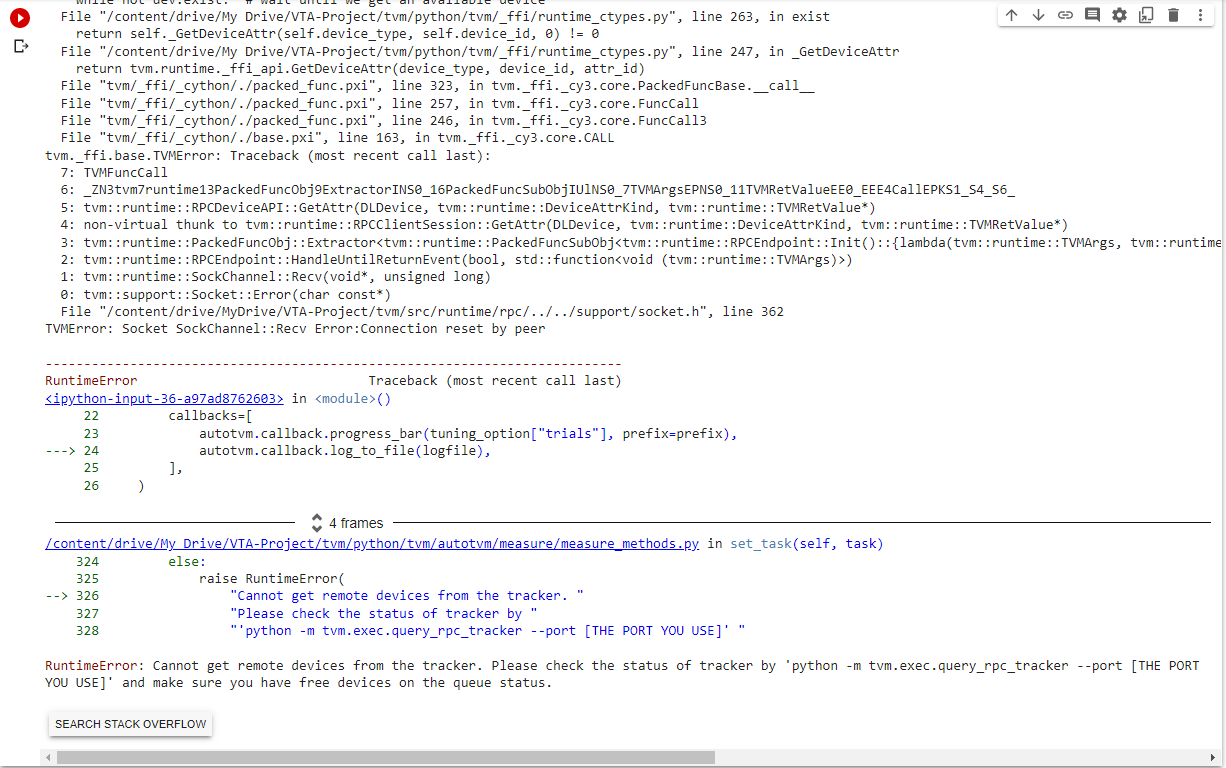Here was the problem: First time I followed this tutorial and used default auto-tuning methods (XGBTuner, GATuner, etc.). Everything was OK. But I would like to change the target from LLVM to VTA so I made some modifications to the original code as follows:
# Load VTA parameters from the 3rdparty/vta-hw/config/vta_config.json file
env = vta.get_env()
# This target is used for cross compilation. You can query it by :code:`gcc -v` on your device.
# Set ``device=arm_cpu`` to run inference on the CPU
# or ``device=vta`` to run inference on the FPGA.
device = "vta"
target = env.target if device == "vta" else env.target_vta_cpu
# Name of Gluon model to compile
# The ``start_pack`` and ``stop_pack`` labels indicate where
# to start and end the graph packing relay pass: in other words
# where to start and finish offloading to VTA.
network = "resnet18-v2-7"
network_onnx = network + ".onnx"
print(network_onnx)
model_url = "https://github.com/onnx/models/raw/main/vision/classification/resnet/model/" + network_onnx
model_path = download_testdata(model_url, network_onnx, module="onnx")
onnx_model = onnx.load(model_path)
start_name = "nn.max_pool2d"
stop_name = "nn.global_avg_pool2d"
print(env.TARGET)
print(target.device_name)
remote = rpc.LocalSession()
# Get execution context from remote
ctx = remote.ext_dev(0) if device == "vta" else remote.cpu(0)
# Load pre-configured AutoTVM schedules
with autotvm.tophub.context(target):
# Populate the shape and data type dictionary for ImageNet classifier input
dtype_dict = {"data": "float32"}
shape_dict = {"data": (env.BATCH, 3, 224, 224)}
# Get off the shelf gluon model, and convert to relay
mod, params = relay.frontend.from_onnx(onnx_model, shape_dict)
# Update shape and type dictionary
shape_dict.update({k: v.shape for k, v in params.items()})
dtype_dict.update({k: str(v.dtype) for k, v in params.items()})
# Perform quantization in Relay
# Note: We set opt_level to 3 in order to fold batch norm
with tvm.transform.PassContext(opt_level=3):
with relay.quantize.qconfig(global_scale=8.0, skip_conv_layers=[0]):
mod = relay.quantize.quantize(mod, params=params)
# Perform graph packing and constant folding for VTA target
assert env.BLOCK_IN == env.BLOCK_OUT
# do device annotation if target is intelfocl or sim
relay_prog = graph_pack(
mod["main"],
env.BATCH,
env.BLOCK_OUT,
env.WGT_WIDTH,
start_name=start_name,
stop_name=stop_name,
device_annot=(env.TARGET == "intelfocl"),
)
with vta.build_config(
opt_level=3, disabled_pass={"AlterOpLayout", "tir.CommonSubexprElimTIR"}
):
graph, lib, params = relay.build(
relay_prog, target=tvm.target.Target(target, host=env.target_host), params=params
)
# Send the inference library over to the remote RPC server
temp = utils.tempdir()
lib.export_library(temp.relpath("graphlib.tar"))
remote.upload(temp.relpath("graphlib.tar"))
lib = remote.load_module("graphlib.tar")
m = graph_executor.create(graph, lib, ctx)
The previous piece of code could normally run but after I added the tuning option and decided to use XGBTuner for auto-tuning the ResNet, it kept running but showed no results:
tracker_host = os.environ.get("TVM_TRACKER_HOST", "127.0.0.1")
tracker_port = int(os.environ.get("TVM_TRACKER_PORT", 9190))
tuning_option = {
"tuner": "xgb",
"trials": 1000,
"early_stopping": None,
"measure_option": autotvm.measure_option(
builder=autotvm.LocalBuilder(),
runner=autotvm.RPCRunner(
env.TARGET,
host=tracker_host,
port=tracker_port,
number=5,
timeout=60,
module_loader=vta.module_loader(),
# check_correctness=True, # TODO: re-enable when check_correctness works again.
),
)
}
logfile = network + "_vta_" + tuning_option["tuner"] + ".json"
print(logfile)
# begin by extracting the tasks from the onnx model
tasks = autotvm.task.extract_from_program(mod["main"], target=target, params=params)
# Tune the extracted tasks sequentially.
for i, task in enumerate(tasks):
prefix = "[Task %2d/%2d] " % (i + 1, len(tasks))
if tuning_option["tuner"] == "xgb":
tuner_obj = XGBTuner(task, loss_type="rank")
elif tuning_option["tuner"] == "ga":
tuner_obj = GATuner(task, pop_size=50)
elif tuning_option["tuner"] == "random":
tuner_obj = RandomTuner(task)
elif tuning_option["tuner"] == "gridsearch":
tuner_obj = GridSearchTuner(task)
tuner_obj.tune(
n_trial=min(tuning_option["trials"], len(task.config_space)),
early_stopping=tuning_option["early_stopping"],
measure_option=tuning_option["measure_option"],
callbacks=[
autotvm.callback.progress_bar(tuning_option["trials"], prefix=prefix),
autotvm.callback.log_to_file(logfile),
],
)
Here was the screenshot: (I did not use PYNQ and I did all the experiments on Google Colab)

